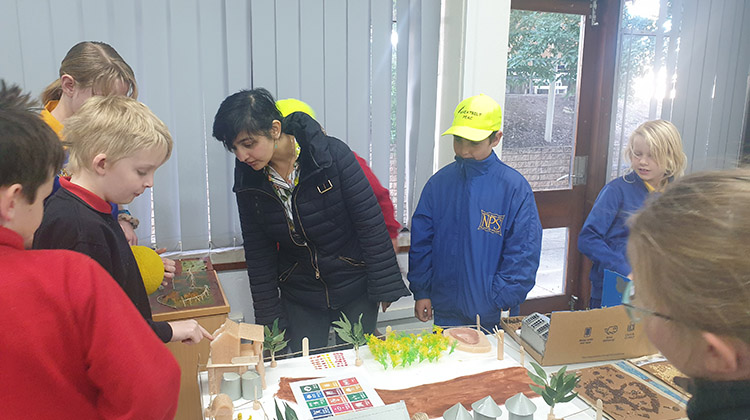STEM knowledge Growing in the Wheatbelt

Western Australia’s expansive Wheatbelt region in the state’s southwest is one of the world’s most science and technology heavy agricultural operations.
That message is being brought to talented students form the area who, through the CSIRO STEM Professionals in Schools program, are exploring the intimate relationship between modern agriculture and technology.
Dr Grishma Vadlamani, a Research Associate specialising in protein crystallography from The University of Western Australia has been partnered with Dr Velu Ramasamy, a teacher and the Coordinator of the Primary Extension and Challenge (PEAC) program for gifted students in the Wheatbelt region.
Together, they helped Year 5 and 6 gifted and talented students from eight different schools explore the subject of agriculture via STEM. The schools included Northam, West Northam, Yerecoin, Kalannie, and Miling primary schools, as well as York, Beverley and Kellerberrin district high schools.
Dr Vadlamani said, "I volunteered with a regional partnership to communicate how routine methods in molecular biology can be the starting point to answer important questions in medical science and agriculture.”
The students looked at soil health, microbes, protein crystallisation and the inner workings of plant cells to understand how to make plants drought proof and resilient to climate change. The students then delivered an exhibition to parents and school leaders to showcase their work.
“The students were enthusiastic and often insightful during our discussions and activities, and I also got the chance to learn more about the inner workings of local farms through the dioramas presented by the students. It was a fun and informative experience, overall," Dr Vadlamani said.
“Regional and rural areas have challenges in terms of equity and access. Many of the schools may not have access to experts, resources and partnership opportunities due to distance and isolation,” Dr Velu Ramasamy added.
“Through the program, students and teachers are given the opportunity to delve deep into STEM areas. It has been an excellent activity to develop critical and creative thinking, and it provides professional development for teachers and for students. It can become an inspirational opportunity for them to pursue these fields in the future which is important for our nation.”
Dr Ramasamy has helped to introduce teachers from an additional 15 local schools to the STEM Professionals in Schools program.
Connecting and Supporting Regional Schools
STEM Professionals in Schools’ Regional and Remote Initiative supports STEM Professionals and teachers through a series of online events. The webinars help them to connect with other participants, share activity ideas, and build ongoing, sustainable partnerships. The partnership support model has been very successful and elements of the webinars have since been rolled out to all STEM Professionals in Schools participants, nationwide.
Online learning has made the process for those with specialist STEM knowledge to share knowledge with schools easier. With video calls, volunteers can speak to classes whereever they are.
Interested in getting involved? Head to the STEM Professionals in Schools website.